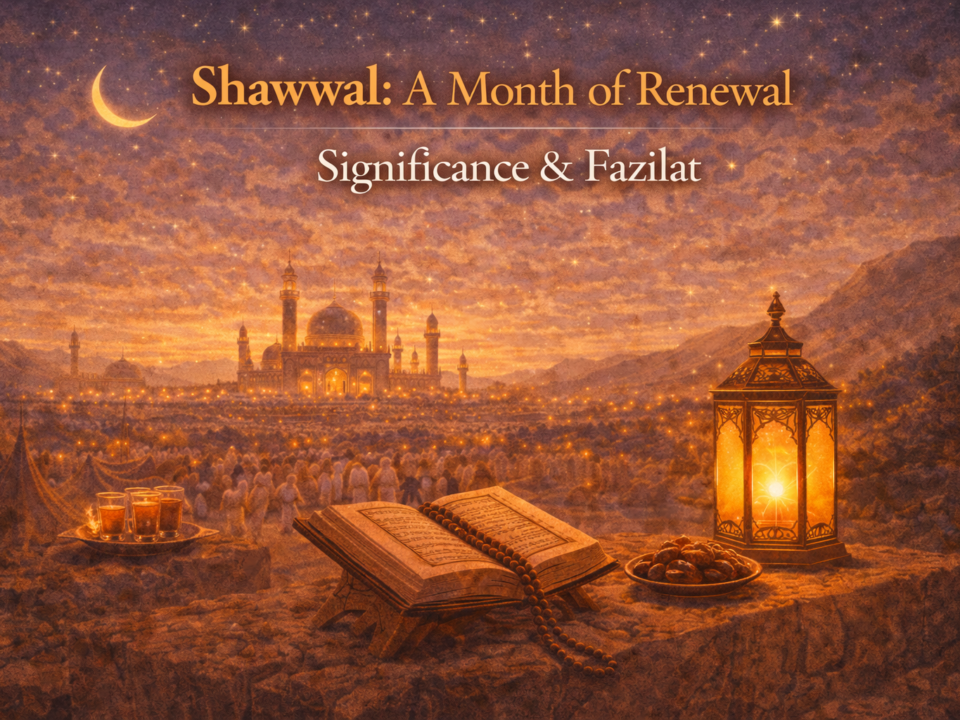The Day of Arafah: A Spiritual Journey Towards Forgiveness and Redemption
Introduction
The Day of Arafah, observed on the 9th day of Dhul-Hijjah in the Islamic lunar calendar, holds immense significance in Islam. This sacred day is an essential part of the annual Hajj pilgrimage and serves as a day of profound spiritual significance for Muslims around the world. In this blog post, we will explore the Day of Arafah, its rituals, and the spiritual lessons it imparts.
The Day of Arafah: A Pillar of Hajj
The Day of Arafah falls on the 2nd day of the Hajj pilgrimage, just one day before Eid al-Adha. Pilgrims gather at the plain of Arafah, a vast desert area located about 20 kilometers southeast of Mecca. Arafah is where the climax of the Hajj pilgrimage occurs, and its significance can be traced back to the time of Prophet Ibrahim (Abraham) and his family.
The Historical Significance
The Day of Arafah is deeply rooted in the history of Islam. It is believed that Prophet Ibrahim (AS), along with his wife Hagar (Hajra) and their son Isma’il (Ishmael), was commanded by Allah to build the Kaaba in Mecca. As a testament to their faith and obedience, they undertook this monumental task. The Day of Arafah commemorates the time when Prophet Ibrahim (AS) stood in prayer and supplication at the same location, seeking Allah’s guidance and blessings.
The Gathering at Arafah
On the Day of Arafah, millions of pilgrims, dressed in simple white clothing (ihram), gather at the plain of Arafah. This immense assembly is a representation of the diversity of the Muslim ummah (community), with people from different backgrounds and cultures coming together in a display of unity.
The Key Ritual: Standing in Worship
The most significant ritual of the Day of Arafah is the act of standing in worship and supplication. Pilgrims stand from the time of Dhuhr (noon) until the time of Maghrib (sunset), facing the Qiblah (the direction of the Kaaba) and engaging in prayers and supplications.
This act symbolizes the Day of Judgment, where all individuals will stand before Allah, seeking His mercy and forgiveness. It is believed that on this day, Allah descends to the lowest heaven and forgives the sins of those who sincerely repent and seek His pardon.
The Spiritual Lessons of Arafah
- Repentance and Forgiveness: The Day of Arafah emphasizes the importance of seeking forgiveness and turning back to Allah. It reminds us that no matter how grave our sins may be, sincere repentance can lead to redemption and Allah’s mercy.
- Unity of the Ummah: The gathering of Muslims from all corners of the world at Arafah highlights the unity of the Muslim ummah. It serves as a powerful reminder that in Islam, there are no distinctions of race, nationality, or social status.
- Humility and Simplicity: The attire of pilgrims in simple white ihram garments underscores the importance of humility and simplicity in the worship of Allah. It reminds us that material wealth and worldly possessions hold no significance on the Day of Judgment.
- Supplication and Du’a: Arafah teaches us the significance of du’a (supplication) in Islam. It is a day when the gates of heaven are open, and sincere prayers are answered. Muslims are encouraged to pray not only for themselves but for the well-being of the entire world.
Conclusion
The Day of Arafah is a time of spiritual rejuvenation, reflection, and devotion for Muslims. It is a day of seeking Allah’s forgiveness, purifying the soul, and renewing one’s commitment to faith. As Muslims stand in worship on the vast plain of Arafah, they are reminded of the Day of Judgment and the ultimate quest for Allah’s mercy and salvation. Beyond the physical pilgrimage, the essence of the Day of Arafah encourages all Muslims, wherever they may be, to engage in acts of worship, repentance, and supplication, as they strive for spiritual growth and righteousness.
عنوان: یوم عرفہ: بخشش اور نجات کی طرف روحانی سفر
تعارف
یوم عرفہ، جو اسلامی قمری تقویم میں 9 ذوالحجہ کو منایا جاتا ہے، اسلام میں بہت اہمیت رکھتا ہے۔ یہ مقدس دن سالانہ حج کا ایک لازمی حصہ ہے اور دنیا بھر کے مسلمانوں کے لیے گہری روحانی اہمیت کے دن کے طور پر کام کرتا ہے۔ اس بلاگ پوسٹ میں، ہم یوم عرفہ، اس کی رسومات اور اس سے ملنے والے روحانی اسباق کا جائزہ لیں گے۔
عرفہ کا دن: حج کا ایک رکن
عرفہ کا دن حج کے دوسرے دن، عید الاضحی سے صرف ایک دن پہلے آتا ہے۔ حجاج کرام میدان عرفہ میں جمع ہیں، یہ ایک وسیع صحرائی علاقہ ہے جو مکہ سے 20 کلومیٹر جنوب مشرق میں واقع ہے۔ عرفہ وہ جگہ ہے جہاں حج کا عروج ہوتا ہے، اور اس کی اہمیت حضرت ابراہیم (علیہ السلام) اور ان کے خاندان کے زمانے سے ملتی ہے۔
تاریخی اہمیت
یوم عرفہ اسلام کی تاریخ میں بہت گہرا ہے۔ یہ خیال کیا جاتا ہے کہ حضرت ابراہیم (ع) کو اپنی اہلیہ ہاجرہ (ہاجرہ) اور ان کے بیٹے اسماعیل (اسماعیل) کے ساتھ مکہ میں خانہ کعبہ کی تعمیر کا حکم دیا گیا تھا۔ اپنے ایمان اور اطاعت کے ثبوت کے طور پر، انہوں نے یہ یادگار کام انجام دیا۔ یوم عرفہ اس وقت کی یاد دلاتا ہے جب حضرت ابراہیم علیہ السلام اللہ کی رہنمائی اور برکت کی تلاش میں اسی مقام پر نماز اور دعا میں کھڑے ہوئے تھے۔
عرفہ میں اجتماع
عرفہ کے دن، لاکھوں حجاج، سادہ سفید لباس (احرام) میں ملبوس، میدان عرفہ میں جمع ہوتے ہیں۔ یہ بہت بڑا اجتماع امت مسلمہ (کمیونٹی) کے تنوع کی نمائندگی کرتا ہے، جس میں مختلف پس منظر اور ثقافتوں کے لوگ اتحاد کا مظاہرہ کرتے ہوئے اکٹھے ہوتے ہیں۔
کلیدی رسم: عبادت میں کھڑا ہونا
عرفہ کے دن کی سب سے اہم رسم عبادت اور دعا میں کھڑا ہونا ہے۔ حجاج ظہر (دوپہر) سے لے کر مغرب (غروب آفتاب) تک، قبلہ (کعبہ کی سمت) کی طرف منہ کر کے کھڑے رہتے ہیں اور دعاؤں اور دعاؤں میں مشغول رہتے ہیں۔
یہ عمل قیامت کے دن کی علامت ہے، جہاں تمام افراد اللہ کے سامنے کھڑے ہوں گے، اس کی رحمت اور بخشش کے طلبگار ہوں گے۔ یہ خیال کیا جاتا ہے کہ اس دن، اللہ سب سے نیچے آسمان پر نازل ہوتا ہے اور ان لوگوں کے گناہوں کو معاف کرتا ہے جو سچے دل سے توبہ کرتے ہیں اور اس سے معافی مانگتے ہیں۔
عرفہ کے روحانی اسباق
توبہ اور استغفار: یوم عرفہ استغفار اور اللہ کی طرف رجوع کرنے کی اہمیت پر زور دیتا ہے۔ یہ ہمیں یاد دلاتا ہے کہ ہمارے گناہ کتنے ہی سنگین کیوں نہ ہوں، مخلصانہ توبہ فدیہ اور اللہ کی رحمت کا باعث بن سکتی ہے۔
اتحاد امت: عرفہ میں دنیا کے کونے کونے سے مسلمانوں کا اجتماع امت مسلمہ کے اتحاد کو اجاگر کرتا ہے۔ یہ ایک طاقتور یاد دہانی کے طور پر کام کرتا ہے کہ اسلام میں نسل، قومیت یا سماجی حیثیت کی کوئی تفریق نہیں ہے۔
عاجزی اور سادگی: سادہ سفید احرام کے لباس میں حجاج کا لباس اللہ کی عبادت میں عاجزی اور سادگی کی اہمیت کو واضح کرتا ہے۔ یہ ہمیں یاد دلاتا ہے کہ مادی دولت اور دنیاوی اموال قیامت کے دن کوئی اہمیت نہیں رکھتے۔
دعا اور دعا: عرفہ ہمیں اسلام میں دعا (دعا) کی اہمیت سکھاتا ہے۔ یہ وہ دن ہے جب آسمان کے دروازے کھلے ہوتے ہیں، اور مخلصانہ دعائیں قبول ہوتی ہیں۔ مسلمانوں کو ترغیب دی جاتی ہے کہ وہ نہ صرف اپنے لیے بلکہ پوری دنیا کی بھلائی کے لیے دعا کریں۔
نتیجہ
یوم عرفہ مسلمانوں کے لیے روحانی تجدید، عکاسی اور عقیدت کا وقت ہے۔ یہ اللہ سے معافی مانگنے، روح کو پاک کرنے اور ایمان کی تجدید کا دن ہے۔ جیسے ہی مسلمان عرفہ کے وسیع میدان میں عبادت میں کھڑے ہوتے ہیں، انہیں قیامت کے دن اور اللہ کی رحمت اور نجات کی آخری جستجو کی یاد دلائی جاتی ہے۔ جسمانی حج کے علاوہ، یوم عرفہ کا جوہر تمام مسلمانوں کو، وہ جہاں بھی ہوں، عبادت، توبہ اور دعا میں مشغول ہونے کی ترغیب دیتا ہے، کیونکہ وہ روحانی ترقی اور نیکی کے لیے کوشش کرتے ہیں۔



